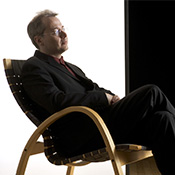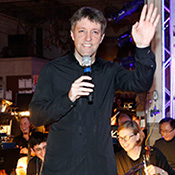
Joshua Weilerstein returns to conduct Symphonie fantastique
David Lewellen
PUBLISHED
Tagged Under: 2017.18 Season, Conductor, Guest Artist
Joshua Weilerstein, who grew up in the most musical of families, now plays no instrument or all of them — depending on how you look at it.
Weilerstein, the guest conductor for the upcoming Milwaukee Symphony program of Berlioz, Prokofiev, and Christopher Rouse, is the son of a well-known violinist and pianist, and the brother of cellist Alisa Weilerstein. But as a conductor, “when it’s working well, it feels like you’re playing every instrument of the orchestra,” he said. “There’s a sense of collaboration that’s really exciting.”
When he enrolled at the New England Conservatory of Music, his main instrument was violin. He began to change his mind after playing under Ludovic Morlot, now the music director of the Seattle Symphony, and then “I would get any conductor who came to NEC to give me a lesson. I watched thousands of videos. And I would get my friends together and offer them pizza to play for me.”
Watching videos of great conductors, of course, is a tool that previous generations did not have available to learn the craft. But at this point, Weilerstein checks only sometimes for reference, “to see what other conductors have done with certain problems in certain scores. Like a fermata, for instance – how do you give everyone the same information at the same time? Every measure of music has issues that you have to decide about.”
His experience as a violinist comes in handy when he talks to the string sections about technique. For other instruments, “you ask them for a certain sound, and then it’s their job to play the instrument.” He confessed that he’s always been curious about learning to play the clarinet, but it hasn’t happened yet.
The weekend’s concert is “a hallucinogenic program,” Weilerstein said. Berlioz’s Symphonie fantastique is such a repertory staple that it’s easy to forget it is a musical depiction of an opium dream, and Bump, the program opener by Christopher Rouse, the conductor described as “West Side Story in hell.” In between is Prokofiev’s violin concerto, whose role in this program is to be “a pleasant dream in the midst of all this madness.”
His previous engagement with the MSO was anchored by Brahms and Dvorak. “It’s definitely a different look this time,” he said, “and that’s really fun.”
Weilerstein’s permanent post is as artistic director of the Lausanne Chamber Orchestra in Switzerland, where he enjoys the chance to program entire seasons rather than a single week as a guest conductor. “I like everything,” he said, “but there’s certainly some repertoire I’ve focused more on – the Russians, and major composers’ lesser-known pieces. I’m also exploring more music by African-American composers and by women, especially in the United States.”
The United States, however, makes up a relatively small portion of his calendar. He and his wife moved to London not long ago, and when he is away from home, it is most often for European engagements.
In his early 30s, Weilerstein has plenty of time to achieve goals such as conducting more Mahler, whose large forces aren’t available in a chamber-orchestra setting. But more fundamentally, he wants to stress “the social and community side of what music can do.” Even in Europe, he said, arts education is diminishing, and “it’s vital that orchestras step into that gaping hole. For selfish reasons, because we need audiences in 40 or 50 years, but also for moral reasons, because children learn so much better when they’re exposed to the arts.” For all of those reasons, the Lausanne Chamber Orchestra has a robust school outreach program. But in the end, Weilerstein said, “I just want to work with people who love music and who want to make great music together.”



